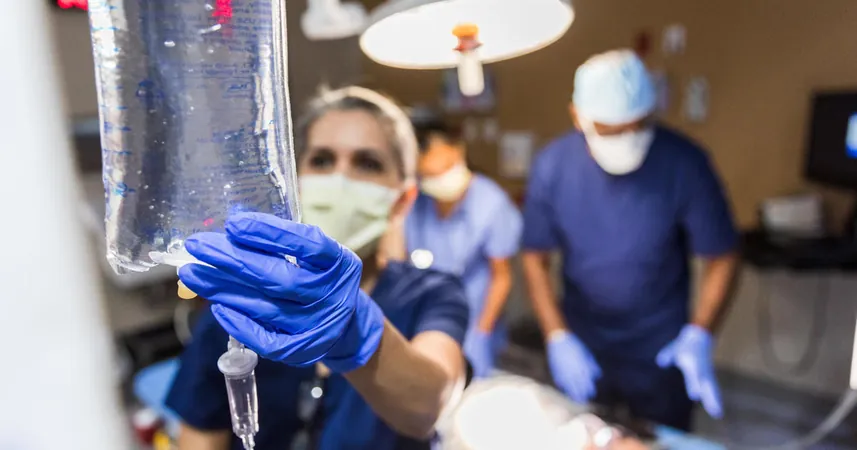
U.S. Hospitals in Crisis: IV Fluid Shortage Sparks Urgent Concerns After Hurricane Helene!
2024-10-04
U.S. Hospitals in Crisis: IV Fluid Shortage Sparks Urgent Concerns After Hurricane Helene!
In a startling development, several hospitals across the United States are facing a significant shortage of IV fluids following the devastating flooding caused by Hurricane Helene. The storm's aftermath has led to the closure of key manufacturing facilities, disrupting a critical supply chain essential for patient care.
Baxter International, the country’s primary supplier of IV fluids, announced that its facility in Marion, North Carolina, is shut down indefinitely due to flood damage. This facility is responsible for a staggering 60% of the nation's IV fluid bags, raising alarms among healthcare providers.
In an official statement, Baxter's chair and CEO, José (Joe) E. Almeida, reassured the public, saying, “Remediation efforts are already underway, and we will spare no resource—human or financial—to resume production and help ensure patients and providers have the products they need.” The company is actively collaborating with federal agencies to mitigate the supply disruption and expedite recovery efforts for affected facilities.
The seriousness of the situation is further underscored by Dr. Paul Biddinger, Chief Preparedness and Continuity Officer at Mass General Brigham. In a recent press conference, he revealed that the hospital system is expected to receive only 40% of its usual IV fluid supply from Baxter, describing the shortage as “one of the biggest shortages” the network has ever faced. This deficiency poses a particular risk for patients undergoing surgeries and those requiring constant hydration for treatment.
In response to the crisis, alternative manufacturers are stepping up to fill the gap. B. Braun announced that none of its manufacturing sites were affected by Hurricane Helene, and is rapidly increasing production at its facilities in Irvine, California, and Daytona Beach, Florida. The company is implementing protective allocation of its products and urging healthcare providers to conserve through the use of alternative hydration strategies.
Additionally, ICU Medical, another key player in the IV fluid market, has also committed to increasing its production to meet the existing demand while ensuring support for its current client base.
This is not the first time hospitals have grappled with such shortages; similar disruptions occurred in 2017 when Hurricane Maria severely impacted IV fluid production. Dr. Biddinger noted the importance of managing medication supplies effectively during crises to minimize patient care disruption.
As the nation confronts this urgent healthcare supply challenge, experts emphasize the need for contingency plans and collaboration among manufacturers and healthcare providers to ensure that patient care continues uninterrupted. The situation remains fluid, and all eyes will be on how quickly Baxter and others can ramp up production to meet the critical needs of hospitals during this time of crisis.
Stay tuned for updates on this developing story as the nation rallies to safeguard healthcare resources in the wake of natural disasters.




 Brasil (PT)
Brasil (PT)
 Canada (EN)
Canada (EN)
 Chile (ES)
Chile (ES)
 España (ES)
España (ES)
 France (FR)
France (FR)
 Hong Kong (EN)
Hong Kong (EN)
 Italia (IT)
Italia (IT)
 日本 (JA)
日本 (JA)
 Magyarország (HU)
Magyarország (HU)
 Norge (NO)
Norge (NO)
 Polska (PL)
Polska (PL)
 Schweiz (DE)
Schweiz (DE)
 Singapore (EN)
Singapore (EN)
 Sverige (SV)
Sverige (SV)
 Suomi (FI)
Suomi (FI)
 Türkiye (TR)
Türkiye (TR)